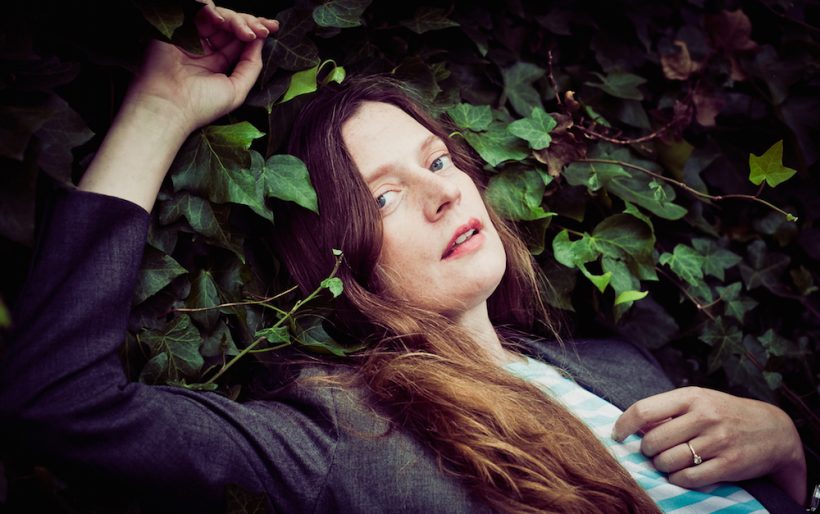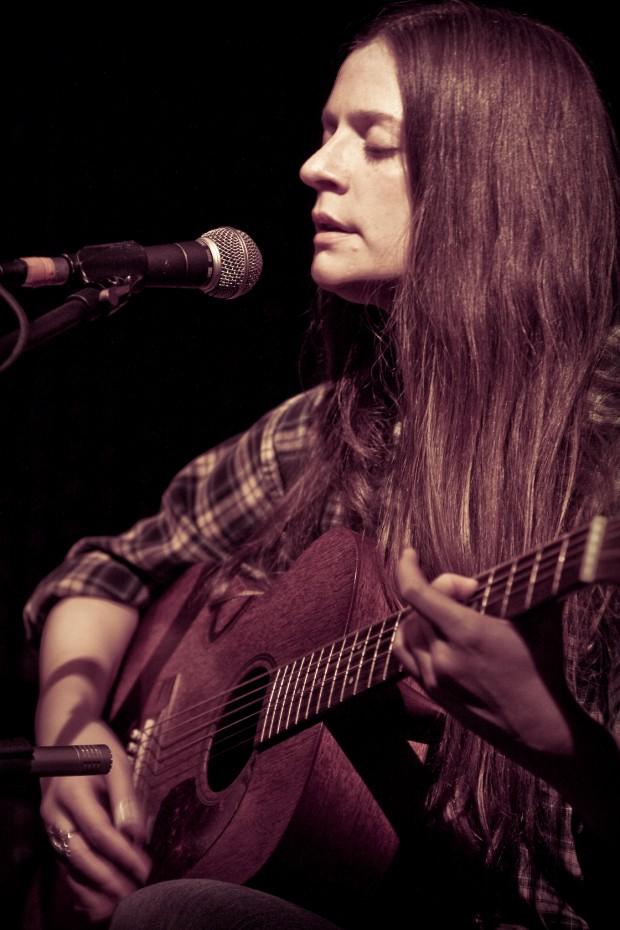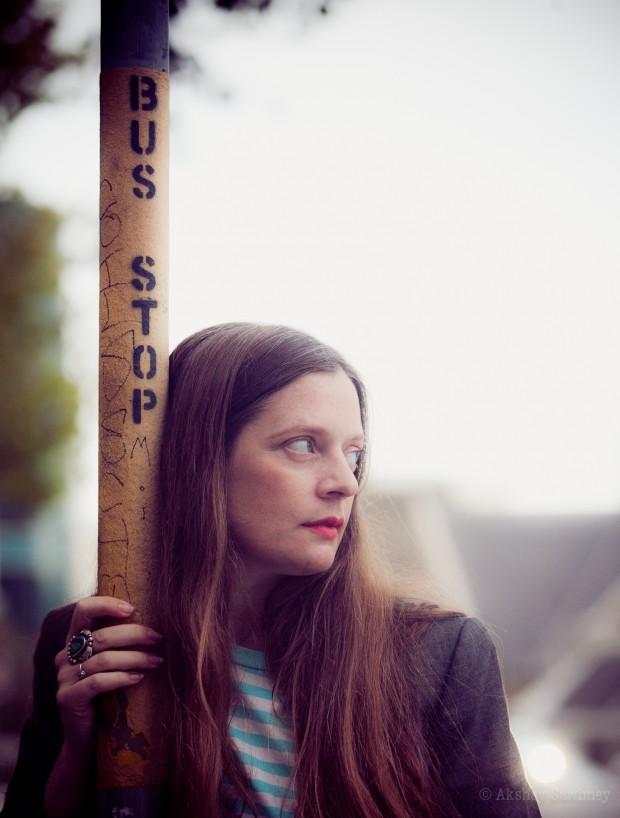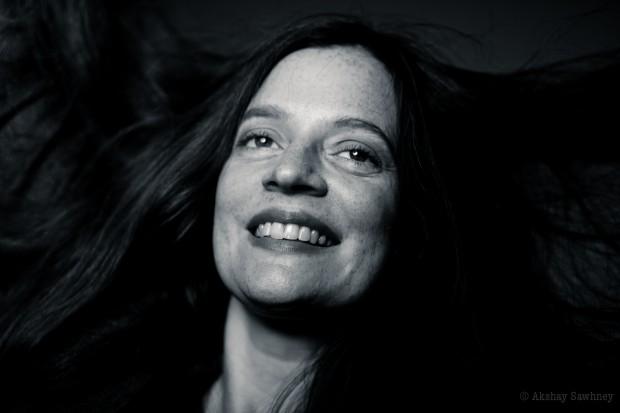
Meg Baird | Photo by Akshay Sawhney | akshaysawhney.com
Interview: Meg Baird on stage fright, recording Light and holding on to her Phillies hat
There’s a type of folk music that’s difficult to listen to in an abstract way, a type that’s difficult to extricate from the rich context of its history. A type that seems to always evoke a sort of timelessness, along with its most prominent practitioners and all of the artists who have carried it into the modern era. Nick Drake. Fairport Convention. Pentangle.
Oh, and “The Battle Of Evermore. “ Obviously.
Toward the end of her until-then lifelong residency in the Philadelphia area, in December of 2010, Meg Baird opened for the late great folk singer and guitarist Bert Jansch at Johnny Brenda’s, at what would be his last appearance here. Shortly following that show – in retrospect, an evening on which the proverbial torch of this tradition and this artistry was arguably passed, metaphorically speaking, between its masters in two generations – Jansch would pass away, sadly, and Baird would uproot, and relocate to the West Coast.

Meg Baird opens for Bert Jansch at Johnny Brenda’s | Photo by Josh Pelta-Heller | koalafoto.com
In the years since, Baird composed her third solo record, Don’t Weigh Down The Light, released in June (Drag City / Wichita). On this record, this uniquely talented songwriter further refines her signature mood, cultivated in the timeless tradition of folk music and the echoes of her forebears but at the same time renewed and recharged.
Meg Baird returns to Philly and to Johnny Brenda’s on August 27th. This time, she’s the headliner, and supported by veteran string players Samara Lubelski and Mary Lattimore. Speaking in the context of this new collection of songs, Baird offers her thoughts on the themes of transition and change, and her advice on what to do when you meet your idols.
The Key: If you can think back when you were starting, as an emerging artist, could you tell me about your feelings about standing in the long tradition of Nick Drake and Sandy Denny and Marianne Faithful, and others that influenced you and your music, and becoming comfortable emerging from that and creating new work?
Meg Baird: Probably the main driver for that would be the fact that I love playing the guitar so much, and those songs really just suit the way I like to play, and some open tunings, and the finger style approach, and kind of in the way especially that artists like Nick Drake would play. I think that’s probably the main leader there, and not as much of this, like, “I have these songs that I have to get out into the world!” [laughs] It’s just I love playing the guitar, and then songs come from the playing, and you know, there’s just an obvious thread there to that type of guitar playing that I’m drawn to.
TK: I saw you open for Bert Jansch a couple years ago at Johnny Brenda’s in Philly – I always marvel when bands get to play with their idols, like when Pearl Jam plays with the Who. Is it intimidating for you, or exciting for you, or both?
MB: [laughs] It’s intimidating AND exciting, very much so. But at that point, it’s best not to think about it TOO much. It’s kind of one of those things, as a performer, you just have to get up there and do it and not overthink it. Usually you think about it when it’s over, not during or before. Like “wow, that really happened!” But those thoughts, I try to keep them away until it’s long over, and be part of the moment. And you know at that point you are support, like your job at that moment is you’re opening for someone who’s amazing, and so you have to keep your head space a little bit more there, [rather] than thinking about the grand scale and where you fit in or whatever. You know, like, hey, you’re the opening slot tonight. Do a good job. [laughs]
TK: Do you get rewarded by conversations with those guys?
MB: Oh, sure. I mean it’s really one of the biggest treasures of being able to play music, is the chances I’ve had to meet people like that. You know, even when they’re not like big long conversations, just being around people and seeing how they work, and getting the little stories and just getting a sense of someone up close, those are probably my favorite experiences I’ve had from playing music.
TK: I was listening to an interview on Radio Times with the lead singer of Wye Oak, Jenn Wasner, recently, and she was saying that as she gets older she actually gets more and more stage fright instead of more and more comfortable playing in front of audiences. Do you get stage fright?
MB: I do get nerves, I mean I’m a shy person in general. But I do like performing. It’s a weird disconnect, where I can be really bold. But there is kind of a physical nervousness that will happen, even it’s it’s not that psychological, especially when you play alone. I’m very nervous about speaking in public. Like I would much rather play, you know, difficult pieces that I barely know – I can do that so much more easily than say a few words in between songs. That’s actually the most stressful part for me [laughs] in playing, and that’s usually what gets me nervous. Especially when I appreciate the audience, and I want to you know, talk to them and you know, have an interaction. But sometimes I’m like, “is this gonna tip the scales and make me start getting nervous and shaky?” It’s really more the speaking part that gets me tripped up than the actual playing!
TK: When you’re writing music, it’s not the most “mainstream” genre – do you consider your audience in writing, or consider reaching a younger audience or most of the people listening to the radio these days, does that cross your mind as you’re composing, or no?
MB: Oh, sure, I like to be really broad. I’m not writing honestly for a specific audience at all, probably just [for] people that are drawn to certain sounds or feelings that you can get from listening to music. But I do definitely think about that. I listen to younger artists, I go to shows where younger artists are playing, I try to be supportive of younger artists. I don’t really make a big compartmentalization of those things, but the idea of new listeners is super exciting, so I definitely pay a lot of attention to it.

Meg Baird | Photo by Akshay Sawhney | akshaysawhney.com
TK: You’ve really managed to maintain the integrity and quality of your work, and you haven’t sort of quote-unquote “sold out.” You don’t seem to have consciously tried to shift more toward pop radio or a broader audience.
MB: I’d consider any sort of sound or process or production that’s interesting. At the scale I’m working, and the type of music I play, I mean it hasn’t been this like constant struggle, you know, “all these producers are asking me to make a commercial record and I’m turning it down!” [laughs] it’s like, that’s just not the world I’m working in. But I’m very open-minded. I’m pretty much making work with people either that I know, or that I’ve wanted to work with. It’s not really a closed thing. But I can’t imagine like intentionally making a record based around marketing ideas. Those things just don’t really compute too well with me. I think some people find that really interesting – marketing and reach – and I’m sure some people can use that in a way that’s really compelling. But it’s probably something that’s outside my interest, my skills, it’s kind of not my territory.
TK: I’m curious about the label that’s bandied about on a lot of reviews and interviews: “psych-folk.” Do you feel comfortable with that label?
MB: I’m fine with it. As long as it’s helpful. I think at this particular moment in music writing, it doesn’t seem to have any strange weight to it or you know, any baggage right now, so it’s pretty comfortable. I think it does mean something to people, it’s helpful. I don’t spend a ton of time you know, crafting that, or really getting too caught up. I try and do my best to be represented well, but I try and, you know, let music writers do their job, and I do mine, and I try and not get too involved. That messaging to me is pretty old-fashioned, but you know, what can I say? [laughs]
TK: In terms of material for your new records, it seems that there’s a lot about themes of change and transition and movement on that record. I know that you moved from Philly to San Francisco (and we’re sorry to have lost you!), but do you think that’s something that you’re very focused on right now, something that you consciously wrote a record about, or did it kind of just come out?
MB: Oh no, it was a big part of the record. Making a move that big, there’s going to be some change there. And also you’re in a completely different place. I usually respond to place, and that was a whole different place to wrap my head around. So it was a big part, definitely with some abstraction to it, but it was certainly one of the larger themes of the record.

Meg Baird | Photo by Akshay Sawhney | akshaysawhney.com
TK: Was it a smooth transition for you, or was it difficult to make the jump from Philly to SF?
MB: Part of it was very smooth. But also really rough too. I mean, I was happy to have the chance to leave, and to be here [in San Francisco]. But I wasn’t particularly looking to leave. You know, my friends, my family is there [in Philadelphia]. So I have, you know, plenty of attachments, I wasn’t really dying to leave [Philly] I’m here with my partner now, and that’s great – he lived in the Bay Area his whole life, so I know that makes things a lot easier when you’re with someone who’s from [the place to which you’re moving]. And the time that I arrived was pretty rough – I mean it wasn’t really a personal thing that happened to me, but the way that the city has changed really since the moment that I arrived in 2012, has been pretty stressful, and anyone I know, most of the people that I used to even know here don’t even live here anymore, because the rent’s rising, and you know, getting into all of those issues facing San Francisco right now — and really everywhere – but, that hyper-condensed venture-capital tech-world takeover stuff that’s going on was really difficult to see close-up. So in that way it was rough. Because, even plans that I’d had when I moved here, everything kind of evaporated because the city had changed so much in such a short time.
TK: I was reading in a recent interview that you mentioned you’d have your own recording space when you moved out there. Looking back now on the record that you made out there, how do you think having your own space affected the music and the content, the writing, and the sound?
MB: Well I have a lot more access to different gear. I’m staying pretty close to my “homey” process, you know, working a lot at home. But being able to play with Charlie [Saufley] – he did all of the lead work and also helped with sounds, and was a huge part of the record in general. So, being able to collaborate again and having access to lots of different gear, that really opened some stuff up. I hope to explore it more. I still kind of stayed pretty “bedroom-guitar” [laughs] in how I was writing and working but you know. Steps, I guess.
TK: Yeah, a review of your new record on Pitchfork observed that it was closer to an Espers’ sort of sound than you had approached in awhile. Is that something you miss, sort of a bigger band sound?
MB: Yeah, I think even just having the collaboration, and I think enough time has passed by now that I was feeling more comfortable to use all of my influences and different modes of writing. I think with the other two solo records I made were relatively narrow in what I was pulling from, and I think with this last record I felt more comfortable to look at all of my own past work, and even be influenced by anything I’ve ever been interested in, just way, way broader and going back further into my own musical history.
TK: Do you sort of miss the collaborations with the old Philly scene guys like your friends in War On Drugs and Kurt Vile?
MB: I only collaborated with Kurt just occasionally, which is always super fun. But I do miss seeing them, I miss all my music friends in Philadelphia. But that’s been the closest community I’ve found here [in San Francisco], is musicians I know here, and to start playing with some of the musicians out here – it’s pretty much been the most grounding force that I’ve found with such a big move.
TK: I’m glad to see you have the “267” phone number still!
MB: Yeah, I’m holding on. I still have a Phillies hat.
Meg Baird plays Johnny Brenda’s on Thursday, August 27th. More information on the 21+ show can be found at the XPN Concert Calendar.